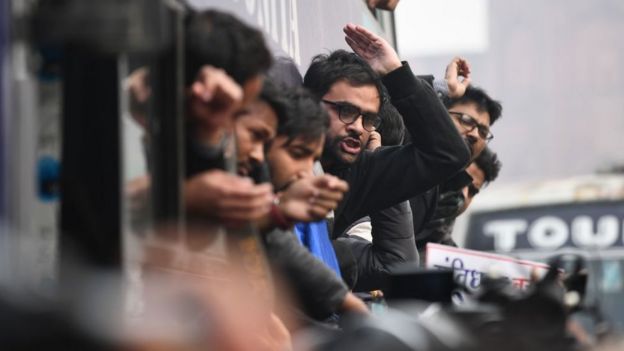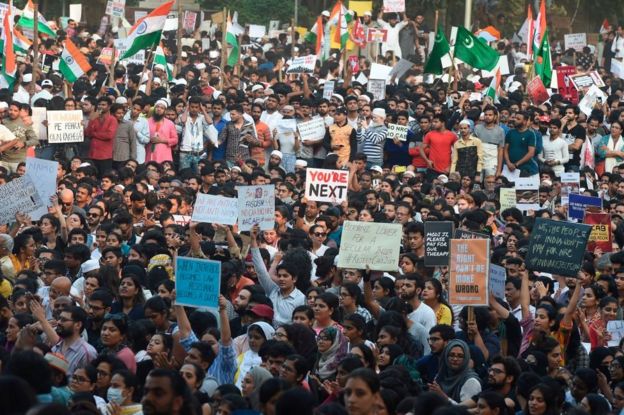Muslim Rage In India
"In the past few years, there has been a rise of right-wing Indian immigrants -- who have been on the ground accusing anyone who speaks against (Prime Minister] Narendra Modi of being anti-Indian and anti-immigrant."
"They're trying to manufacture this discourse that anyone who challenges the BJP [Bharatia Janata Party of Hindu nationalists] is essentially anti-India or Hindu-phobic."
Divyani Motla, Indian student, University of Toronto
"There's a lot of hateful posts that I see from people living in Canada and originating in India."
"It concerns me, because this country is different from back home and people still carry that baggage here."
Nasser Khan, Indo-Canadian
 |
| Demonstrators shout slogans during a protest against a new citizenship law and to show solidarity with the students of New Delhi's Jamia Millia Islamia university after police entered the university campus on Sunday following a protest against the new law, in Ahmedabad, India, December 17, 2019. (REUTERS/Amit Dave) |
The newly introduced Citizenship Amendment Act (CAA) passed by the ruling BJP party in India has stirred up a hornet's nest of Muslim protest in India, protests that have become increasingly violent, leading the Indian military to respond with its own level of force. This is not a new bill, but one that was passed in 2014; it has been amended with a view of enforcement. India is basically a Hindu nation, but its huge population base also holds minority groups of various sizes.
The largest minority group is Muslim, and as a minority of 180 million, they represent 14 percent of the population.
After Indonesia and Pakistan, India has the second-largest Muslim population in the world. At independence and partition, when India wrenched itself away from British rule, it shed a significant portion of Muslims in an agreement that created Pakistan, a significantly Muslim-majority country whose relations with India are fraught, uncertain and sometimes deadly. India has reason to fear that many of its Muslim citizens are more loyal to Pakistan than to India.
 |
| Police have escorted students to buses, driving away from demonstrations Getty |
The new citizenship law accelerates citizenship for refugees facing discrimination and seeking haven in India from Bangladesh, Pakistan and Afghanistan. Muslims are specifically excluded; favoured are Hindus, Sikhs, Buddhists, Jains, Parsis and Christians. The law is built on the premise that conditions for religious minorities are unsafe in those three Muslim countries. The law has no impact whatever on Indian Muslims; it simply will not give citizenship to Muslim refugees.
Muslim Indians have responded with typical frenzied ferocity with massive protests on the streets, on campuses, leading to riots in the northeast of the country where five people lost their lives. Muslim crowds have attacked buses and railway stations and police have responded in force. The crux of the matter appears to be Narendra Modi and his Hindi nationalist party taking steps to ensure that India remains a Hindu nation. Just as Pakistan, Bangladesh and Afghanistan are Muslim nations.
 |
| Indian students of the Jamia Millia Islamia University and locals participate in a protest demonstration against a new citizenship law in New Delhi, India, Saturday, Dec. 21, 2019. (AP Photo/Altaf Qadri) |
It just happens not to accord with the secularist mission of the original constitution after independence. That India could ever be neutral seems a stretch, but that is what the founding state declared itself to be. So despite the obvious declaration of Hindu nationhood, India remains prepared and dedicated to offering citizenship to illegal refugees, responding to their need for refuge, in abandoning countries where they are persecuted.
Persecuted in a Islamist-centric country like Pakistan where it is a capital offence to say or do anything that might be construed as critical of Islam or of the Prophet Mohammad. Like the death sentence passed this week as punishment for a U.S.-educated Pakistani academic, working as a university professor in Pakistan whom critics accuse of insulting Islam. Like the Christian woman who spend years on death row awaiting execution on charges of defaming Mohammad.
In and of itself this new citizenship amendment doesn't appear to threaten the place of the Muslim minority in India, and it does throw a lifeline to non-Muslims who are threatened in Muslim-majority countries nearby. As for transporting the sectarian divisions in the diaspora, it is wrong and it is unfortunate. Canada has a significant Indian Hindu and Sikh population and it has an equally significant Muslim population. Their differences should be dissolved with their Canadian citizenship.
 |
| Hundreds have gathered in Mumbai to protest Getty Images |
Labels: Citizenship Act, India, Muslims, Riots

<< Home